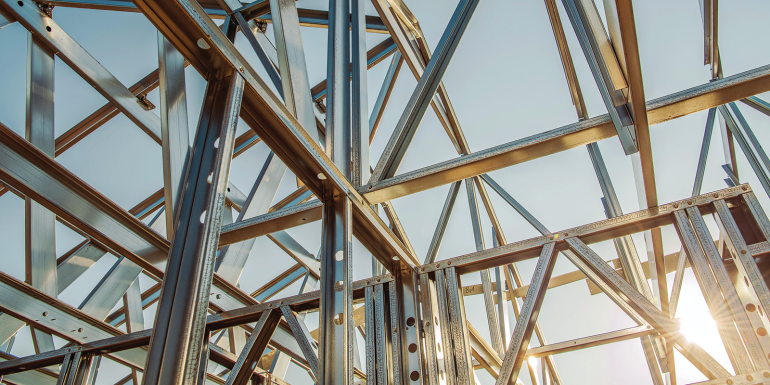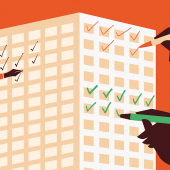Problems arise from reduced site inspections during pandemic

Collaborative reporting for safer structures. Report 967, Covid-19 and the impact on construction quality
A reporter is concerned that during the Covid lockdowns, there may have been work done without adequate independent supervision.
The Construction Leadership Council issued guidelines (bit.ly/3VITNbs) on the safe operation of building sites, and the government said that construction sites should continue to operate, albeit with social distancing. This meant that construction work has carried on throughout the Covid-19 situation, to varying degrees. The degree of compliance with guidelines on sites has also been variable as building control bodies, verifiers, warranty inspectors and clients’ agents limited their inspections of the works
The government did issue guidance to building control bodies and verifiers that ensured that they should not be signing off projects on the basis of remote inspections or photographs. However, the number of inspections during projects fell significantly during this period, which means that defects are less likely to have been picked up.
Comments
“The measure of a man’s real character is what he would do if he knew he would never be found out” (Thomas Babington Macaulay). Similarly, “There is hardly anything in the world that some man cannot make a little worse and sell a little cheaper, and the people who consider price only are this man’s lawful prey” (John Ruskin).
It is true to say that the level of building control inspection was reduced and that some of that inspection was by remote means. There may well be latent defects that come to light in the future as a result. There is a proven history in recent times of buildings being built badly. The most recent experience with that is in relation to external wall construction, where the costs have been high, including for whoever must pay to rectify it; this may be the insurers, the contractors, the people who end up owning those badly built buildings (often homeowners) or the government (which is assuming the costs in many cases).
The difficulties encountered by the Coronavirus restrictions do not mean that the contractors or developers had any less responsibility to get things right, of course. Contractors and developers need to have taken additional measures to carry out inspections before the work is finished and made inaccessible. A potential complication is that this work is in the past, so once again reliance is going to be placed on the records claiming how the inspections have been made.
Regrettably, within a contractual chain, there may be stakeholders who, because of time and cost pressures, or even a culture of inadequate professionalism, will cut corners and attempt to cover them up – especially in hidden parts of structures. It is also expected, as part of human nature, that mistakes may be made in any well-organised and well-intentioned process. The purpose of systems of work is to check and identify errors so that they can be corrected.
Lockdowns may have changed perceptions of what is normal and what is acceptable. The panel encourages a return to pre-lockdown levels of supervision of construction (albeit acknowledging that technology methods for inspection may have moved on). This is also part of the previous wider debate on what level of supervision is acceptable, and what clients (and society) are willing to pay for.
Key learning outcomes
For contractors:
- consider the environmental constraints holistically and carry out additional checks where appropriate.
For designers:
- where possible and contracted to do so, carry out thorough site inspections; and
- adapt your activities as reasonably as possible to the novel natures of remote working.
For building control approval bodies or verifiers:
- be aware that business-as-usual checks on-site may not have occurred.
For clients, developers and owners:
- supervision and proper checking are cheap insurance; and
- consider the impact of separating design teams from inspection activities.
A Scottish perspective
From a Scottish point of view, legislation is very clear that checking is the responsibility of the “relevant person” – typically the client (owner or developer). It is common for a traditional client to have a clerk of work appointed on their behalf to undertake a checking role.
Local authorities are appointed by the Scottish Government as verifiers. Before construction starts, they verify that the warrant drawings meet the building regulations and grant a building warrant. Before one can legally occupy a building, the “relevant person” must apply for a completion certification, and “the verifier will undertake reasonable inquiry” before granting. They are not required to monitor all construction work.
Clients who are not willing to assume the cost of site inspections will choose and use inspectors on the basis of cost when they can. This is all the more worrying if one considers the findings of the Hackitt Interim Report, where in paragraph 5.24 it is stated that “much of the feedback received indicates concerns that increased privatisation reduces the independence of the review process and leads to a decreasing capacity and expertise in local authorities. There are notable concerns also that third-party inspections are open to abuse given the potential conflict of interests, with growing levels of mutual dependence between developers and contracted inspectors.”
It is highly encouraged that those responsible for buildings constructed during this period should be aware of the issue and carry out their own verification of important details. The importance of good records cannot be overstated.
Another recommendation, in anticipation of future challenges, is to plan assurance methods that are robust to the sorts of constraints that the Covid-19 pandemic brought. An example of that, considering the use of assistive technology, is how many industries have already developed photography-based AI-enabled fault recognition
Design teams could identify “hold points” where direct inspection and thorough interrogation of the works take place; it will also serve the purposes of the client’s insurance and assurance.







